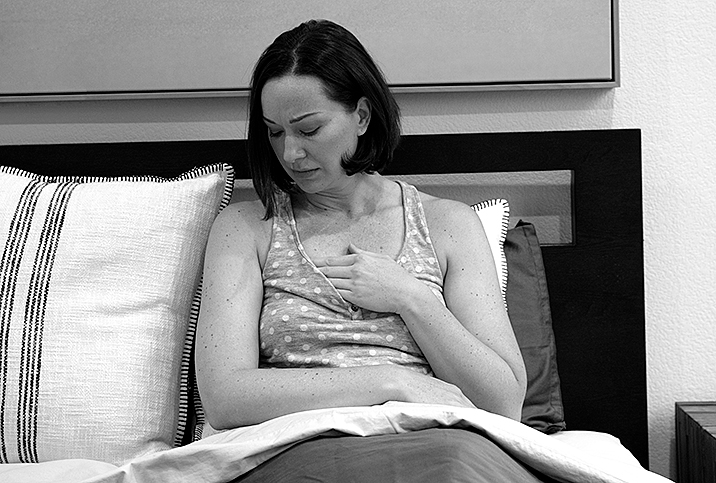The Effects of Diet and Exercise on Breast Health

The breast cancer stats for American women are hard to swallow—1 in 8 will develop breast cancer, roughly 85 percent of those cancers aren't linked to family history, and about 43,000 women are expected to die from breast cancer in 2021 alone. That makes breast cancer the cancer with the second-highest death rate for women, just behind lung cancer.
The reality is, the greatest risk factors for developing breast cancer are sex (the very fact you're a woman) and age (cellular changes that simply take place with the passage of time). And there's very little you can do to change either of those realities.
That said, diet and lifestyle can, in fact, help reduce the risk of developing breast cancer. While they can't prevent cancer from occuring, paying attention to nutrition and exercise, as well as keeping your body composition in a healthy range, can help lower your risk factors.
Not to mention, individuals diagnosed with breast cancer who eat well and exercise during and following treatment are more likely to experience positive outcomes.
While there are no guarantees, and everyone knows someone who was "the healthiest person I knew" before a terrible diagnosis, taking steps to maintain all-around health can reduce the likelihood of developing breast cancer. Here's what you need to know.
Regular exercise is protective
The national guidelines for physical activity state adults should accumulate at least 150 minutes of moderate-intensity exercise per week (the equivalent of walking 30 minutes a day, five days per week), or 75 minutes of vigorous-intensity exercise per week (the equivalent of jogging 15 minutes a day, five days per week), or some combination of the two.
This, combined with muscle-strengthening activities performed at least two days per week are the baseline suggestions for promoting physical health to help prevent chronic illnesses, including some cancers.
But aside from the general protection you receive from being physically active, studies have looked specifically at the ways exercise helps prevent breast cancer. A 2016 article review found evidence that individuals with a high level of leisure time physical activity were significantly less likely to develop 13 different types of cancer, including breast cancer. Evidence also pointed to the fact that "most of these associations were evident regardless of body size or smoking history."
The higher the level of physical activity a person performed, the lower the likelihood they were to develop that type of breast cancer.
Even more to the point, the same study showed an inverse relationship between those who had high levels of physical activity and those who developed estrogen receptor-negative breast cancer. In other words, the higher the level of physical activity a person performed, the lower the likelihood they were to develop that type of breast cancer.
What's important to recognize is when researchers were considering "low physical activity" versus "high physical activity," they basically assessed whether a person failed to meet national activity guidelines, met the guidelines or were more active than the suggested guidelines.
You don't have to run marathons or become a CrossFit enthusiast to enjoy the cancer-related benefits of physical activity. Rather, you can start by aiming to accomplish the national exercise guidelines mentioned above.
Taking five, 30 minute walks per week and adding a series of strength training moves to the end of two of those walks is all it takes to help reduce your risk. Then, once your exercise habit is engrained, adding a little extra activity may reduce your risk further.
There appears to be a dose-response relationship between exercise and a reduced risk of breast cancer, which means the more active you are, the lower the risk tends to be.
Eating a plant-based diet can help with prevention
There is a reason doctors, dietitians and health coaches point so frequently to a healthy diet as an important way to safeguard against chronic diseases—there's a wealth of research that supports the claim. And it's not just because eating a plant-filled, whole-food diet can help you maintain a healthy body composition.
Yes, maintaining a healthy weight is important, but even if you're carrying a few extra pounds, switching to a plant-based diet could significantly improve your health. This is because plants are chock full of nutrients that help fight cellular damage that can lead to conditions like breast cancer.
As it specifically applies to breast cancer, there's significant evidence that there are benefits of adhering to a plant-based diet. A 2017 study published in the European Journal of Cancer Prevention titled "The potential contribution of dietary factors to breast cancer prevention," looked at all known studies that investigated links between nutrition and breast cancer.
In the study's conclusion, the authors specifically point out six basic dietary recommendations that appear to decrease the risk of breast cancer "across genetic types and menopausal status." This is significant because age and hereditary risk are common predictors of breast cancer, so if dietary changes can reduce the risk even in these populations, there's certainly good evidence to make nutritional adjustments.
Specifically, these dietary recommendations include:
- Consume a low energy density (low calorie) diet
- Consume a low glycemic load diet (consuming meals that are less likely to result in a blood sugar spike after eating them)
- Consume nutritious, plant-based foods
- Consume fewer animal products
- Limit intake of red/processed meats
- Limit intake of alcohol
The study authors admitted implementing these dietary changes can be challenging without guidance, so they pointed to specific eating plans that have been proven to help people make the changes successfully.
"Nutritional strategies include Mediterranean, DASH, and/or Okinawan patterns, which were found to be more easily applied than the recommendations based on dietary analyses and composition," authors stated.
National health organizations support these guidelines
Beyond studies and anecdotal evidence to support exercise and diet as prevention measures for breast cancer, national cancer organizations offer similar guidelines.
"The American Institute for Cancer Research (AICR) states the best way to prevent cancer through dietary means is by eating cancer-protective nutrients like fiber, vitamins, minerals, and phytonutrients," said Trista Best, MPH, RD, LD, a registered dietitian at Balance One Supplements. "These nutrients are found in vegetables, fruit, beans, grains, nuts, and seeds."
Likewise, AICR points to exercise and maintaining a healthy weight as key cancer prevention factors.
Of course, developing new habits isn't always easy to do, so if you're struggling to get started on your own, consider enlisting a dietitian, personal trainer, or a health coach specializing in behavioral change. A little help can go a long way toward safeguarding your health.


















